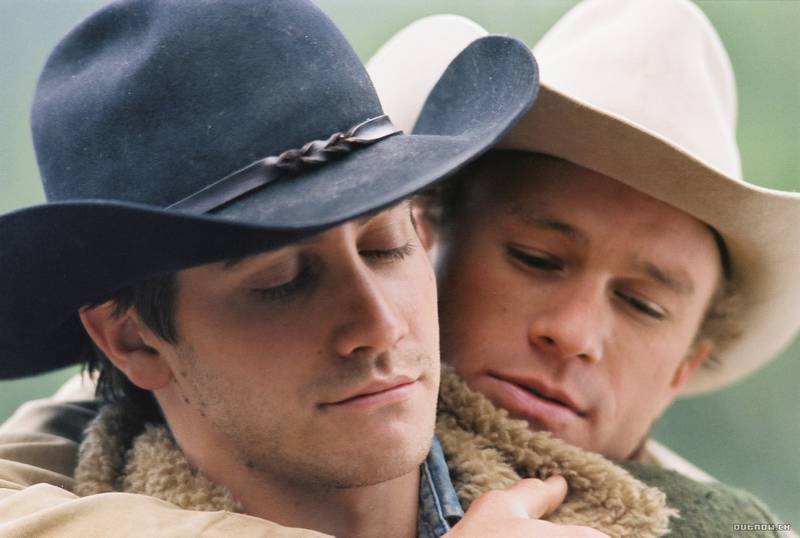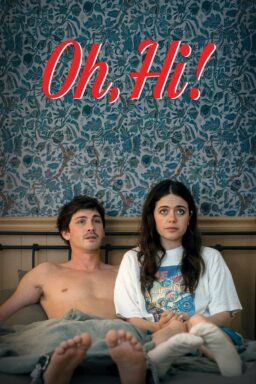While the winners won’t be announced until March 5, you can cast your vote now.
“Brokeback Mountain” and George Clooney were the big winners as the 78th annual Academy Award nominations were announced Tuesday. The movie, which chronicles a lifelong romance between two cowboys, led all films with eight nominations. And Clooney scored a personal triumph with three nominations — for directing, producing and co-writing “Good Night, and Good Luck,” and as best supporting actor in “Syriana.” Clooney could have been a four-time nominee, tying a record with Orson Welles and Warren Beatty, but he declined a producer’s credit on “Good Night, and Good Luck.”
The increasing divide between good movies and box-office grosses was dramatized when all five best film nominations went to titles that have so far been out-grossed by a documentary about penguins. “March of the Penguins,” nominated for best documentary, has taken in $77.4 million, vs. the best film nominees “Brokeback Mountain” ($50.8 million), “Capote” ($14.3 million), “Crash” ($55 million), “Good Night, and Good Luck” ($24.9 million) and “Munich” ($38 million).
Some smaller films will have their fates changed by the nominations, especially “Transamerica” (best actress Felicity Huffman), “Mrs. Henderson Presents” (best actress Judi Dench), “North Country” (best actress Charlize Theron and supporting actress Frances McDormand), “Hustle & Flow” (best actor Terrence Howard), “Junebug” (supporting actress Amy Adams) and “A History of Violence” (best supporting actor William Hurt).
The Academy’s voters did their homework in reaching back into the year to remember “Crash,” which opened in May, and by noticing smaller films like “Transamerica,” which still has not passed $1 million, and “Junebug,” which is under $3 million. It also did some targeted voting, nominating Paul Giamatti as best supporting actor for “Cinderella Man” but pointedly neglecting the film’s star, Russell Crowe, who was involved in a messy situation involving a hotel clerk and a thrown telephone. Voters also belatedly honored the talents of two actors who have long and often been splendid, Matt Dillon (“Crash”) and David Strathairn (“Good Night, and Good Luck”).
As expected, Joaquin Phoenix and Reese Witherspoon were nominated in the top acting categories for their uncanny performances as Johnny Cash and June Carter Cash in the popular “Walk the Line.” But the movie was edged out of the best film category, possibly by Steven Spielberg’s “Munich,” which also won Spielberg a nomination as best director. The success of “Munich” in these two important categories was surprising, considering the volume of controversy over the film’s story of an Israeli assassination team.
“Crash” was the comeback story of the year. It opened in May, built steadily through word of mouth during the summer, was out of theaters by September, and was considered out of the running since the academy tends to favor films that have opened in the autumn or are still in theaters. But its strong showing on critics’ year-end “best 10” lists inspired new interest, the movie found many viewers on DVD, and last week upset “Brokeback Mountain” to win the best ensemble award at the Screen Actors Guild Awards. From the cast of more than 20 stars, Dillon scored a best supporting actor Oscar nomination.
Actor Don Cheadle was passed over, but his consolation on Oscar night could come if “Crash” wins as best picture; he co-produced it, and personally persuaded its stars to appear for a fraction of their salaries. Alas, he will not be onstage to collect the top prize, because the Academy has limited the number of producers who can accept to two: Paul Haggis and Cathy Schulman. The movie also scored nominations for Paul Haggis for best direction and original screenplay (co-written with Bobby Moresco), continuing his streak after “Million Dollar Baby,” which he wrote, won as last year’s best picture.
At this point the best picture category looks like a horse race between “Brokeback Mountain” and “Crash,” with “Crash” gaining in the turn. But if one of Hollywood’s most reliable predictors holds true, “Brokeback” will win by a nose; its director, Ang Lee, won the Directors Guild Award last weekend, and 51 of the 57 DGA winners have seen their films go on to win as best picture.
The eight nominations for “Brokeback Mountain” are vindication for a story many in Hollywood were not eager to finance. Heath Ledger and Jake Gyllenhaal were nominated as best actor and supporting actor for their roles as two young sheepherders who fall in love, but keep their homosexuality a secret through marriages and a lifelong but doomed romance. Some cynics predicted a quick box-office fade because of the movie’s the gay subject matter, but “Brokeback” opened strong and has won broad support from general audiences.
Ang Lee’s second nomination as best director underscores the diversity of his films; he was named in 2001 for “Crouching Tiger, Hidden Dragon.” Clooney’s nomination continues his interest in television (his father was an anchorman); he also directed “Confessions of a Dangerous Mind,” the Chuck Barris story, in 2002. Most years the Academy selects one director whose film was not nominated for best picture, but this year the directors of all five “best films” were named. That was a particular triumph for two first-time feature directors, Paul Haggis, and Bennett Miller (who earlier made one documentary). Spielberg, who rounds out the five, found support even though his “Munich” was attacked as anti-Israeli and anti-Palestinian and even for being “too balanced.
This year’s nominations reinforced two academy tendencies: It likes to nominate British actors, and it likes performances in which the actors play dramatically against type. Dame Judi Dench’s nomination for “Mrs. Henderson Presents,” the story of a doughty British widow who opens a Soho theater featuring nudity, was expected, but 20-year-old Keira Knightley’s best actress nod for “Pride & Prejudice” was a surprise. So often do British Dames win nominations (this is the fifth for Dench), that it’s been suggested American actresses add the title to their names, as, for example, Dame Reese Witherspoon.
Actors playing against type included, once again, Charlize Theron, who won for “Monster” in 2004 by playing a serial killer who looked nothing at all like the glamorous actress, and was nominated again this year as a hard-working Minnesota miner in “North Country.” Another shape-shifter: Felicity Huffman was named for playing a man who wants to become a woman in “Transamerica.” And I suppose anyone playing Truman Capote, as Philip Seymour Hoffman does so effectively in “Capote,” would be operating outside any notion of type.
Three nominations showed the academy voters as especially perceptive. They did themselves proud by nominating Amy Adams, for her brilliant performance as a pregnant young wife in “Junebug.” They honored William Hurt’s small but unforgettable role in “A History of Violence.” And they correctly saw through the advertising hype to recognize that Terrence Howard’s work in “Hustle & Flow” created a nuanced and complex character, a pimp who is disillusioned by his life, determines to begin a music career, and through the experience of art, learns new respect for women, and for himself.
Other interesting categories are those for best documentary, best foreign film and best animated film. “March of the Penguins” of course was a nominated documentary, and so was the powerful “Murderball,” about full-contact quadriplegic wheelchair rugby. Also named was “Enron: The Smartest Guys in the Room,” which uses tape recordings to document that the California energy “crisis,” among other things, was deliberately caused by Enron to generate desperately needed profits. I haven’t seen “Darwin’s Nightmare” or “Street Fight,” but I keenly miss the presence of Werner Herzog’s “Grizzly Man,” the year’s best doc.
Among the foreign films, two perhaps unexpected titles are “Tsotsi” and “Paradise Now.” Following the nomination of “Yesterday” last year, “Tsotsi” underlines the South African filmmaking renaissance. And “Paradise Now,” the story of two Palestinian terrorist bombers (one convinced, one wavering) follows its (also admittedly meaningless) Golden Globes win and joins “Munich” in a thoughtful analysis of the cycle of tragedy in the Middle East.
The three animated films are notable in that all originated outside the Disney and Pixar universes and were made mostly by hand, with a minimal amount of computer-generated animation. “Howl's Moving Castle,” distributed by Disney, is by the Japanese master Hayao Miyazaki. “Wallace and Gromit: The Curse of the Were-Rabbit” from the U.K., is stop-action animation by Steve Box and Nick Park. And “Tim Burton's Corpse Bride” also is a stop-action film, in which backgrounds and some movements may be computer animated, but the essential work involves making minute adjustments of model figures.
This year’s Academy Awards will be presented on Sunday, March 5, with Jon Stewart of “The Daily Show” as host. A highlight will be an honorary Oscar for the great director Robert Altman.
Box office figures taken from the Internet Movie Database.












